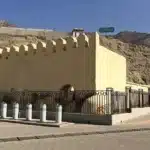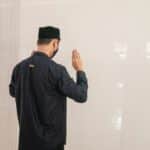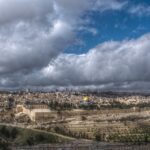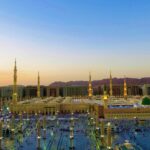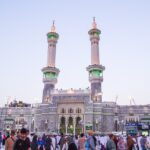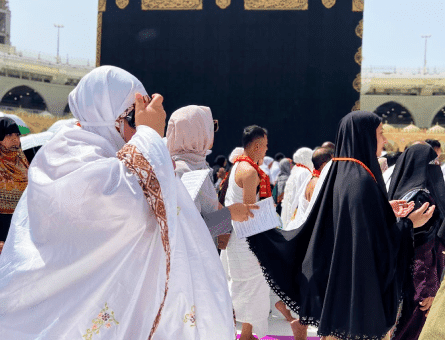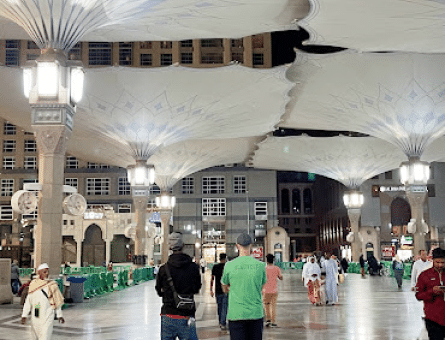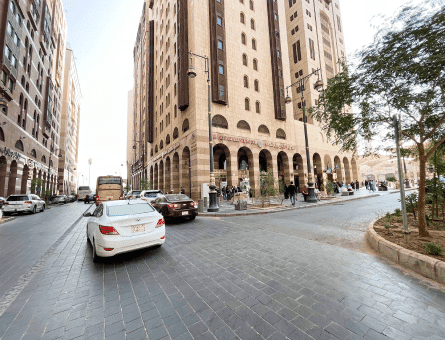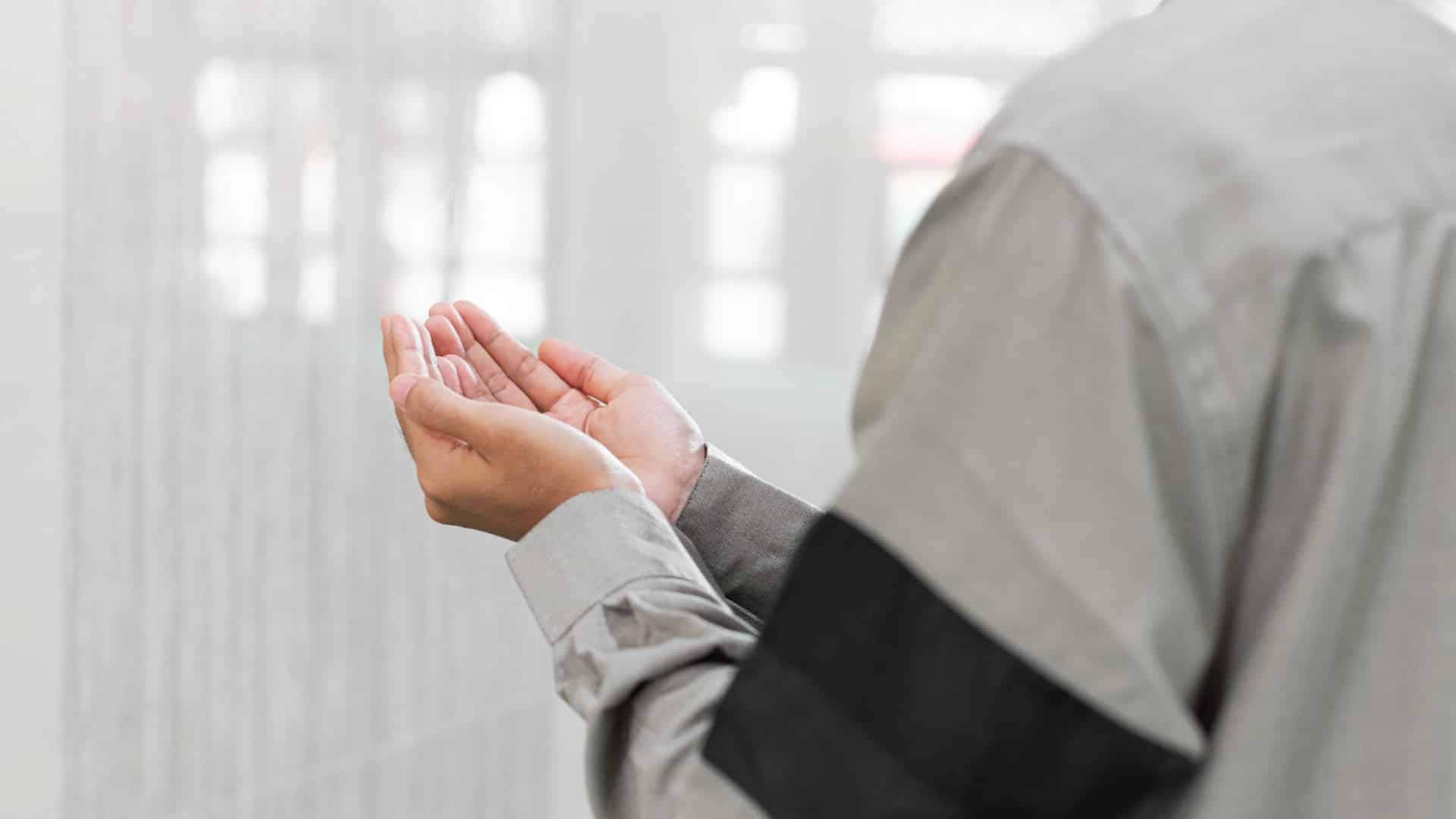What To Say When Visiting Prophet Muhammad’s (PBUH) Grave?
Are you going to travel for Hajj or Umrah? After completing the rituals of pilgrimage, use the time you have to visit the tomb or grave of Prophet Muhammad (PBUH) in Masjid Nabawi, Medina, Saudi Arabia.
While the act of visiting the Prophet Muhammad (PBUH) is traditionally categorised as a Sunnah practice, certain scholars have highlighted its importance, stating it to be Wajib (mandatory) due to its profound significance.
Across successive generations of devout Muslims, there has been a consistent tradition of visiting the grave of Allah SWT’s beloved Messenger (PBUH), saying Salam, and seeking his intercession on the Day of Judgement.
Read on to learn what to say when visiting the Prophet’s (SAW) grave.
Du’a to Read When Visiting Prophet Muhammad’s (SAW) Grave
Recite the following duas when visiting the grave of Prophet Muhammad (PBUH):
اَلسَّلَامُ عَلَيْكَ يَا رَسُوْلَ اللهِ
Transliteration: As-salāmu ‘alayka yā rasūlAllāh.
Translation: Peace be upon you, O Messenger of Allah.
اَلسَّلَامُ عَلَيْكَ يَا رَسُوْلَ اللهِ
السَّلَامُ عَلَيْكَ يَا خَيْرَةَ اللهِ مِنْ خَلْقِهِ
اَلسَّلَامُ عَلَيْكَ يَا حَبِيْبَ اللهِ
اَلسَّلَامُ عَلَيْكَ يَا سَيِّدَ الْمُرْسَلِيْنَ وَخَاتَمَ النَّبِيِّيْنَ
السَّلَامُ عَلَيْكَ وَعَلَى آلِكَ وَأَصْحَابِكَ وَأَهْلِ بَيْتِكَ وَعَلَى النَّبِيِّيْنَ وَسَائِرَ الصَّالِحِيْنَ.
أَشْهَدُ أَنَّكَ بَلَّغْتَ الرِّسَالَةَ وَأَدَّيْتَ الأَمَانَةَ وَنَصَحْتَ الأُمَّةَ
جَزَاكَ اللهُ عَنَّا أَفْضَلَ مَا جَزَى رَسُوْلَاً عَنْ أُمَّتِه
Transliteration: As-salāmu ‘alayka yā rasūla llāh. As-salāmu ‘alayka yā khyarata llāhi man khalqihi. As-salāmu ‘alayka yā ḥabiba llāh. As-salāmu ‘alayka yā sayyida l-mursalina wa khātama n-nabiyyīn. As-salāmu ‘alayka wa ‘ala ālika wa aṣḥabika wa ahli baytika wa ‘ala an-nabīyyina wa sā’ira ṣ-ṣaliḥin. Ashhadu annaka balaghta r-risāla wa addayta l-amāna wa naṣaḥta l-ummah. Jazāka llāhu ‘anna ‘afḍala ma jaza rasūlan ‘an ummatihi.
Translation: Peace be upon you, O Messenger of Allah. Peace be upon you, O choicest creation of Allah.
Peace be upon you, O beloved of Allah. Peace be upon you, O leader of all messengers, seal of the prophets. Peace be upon you, upon your family, upon your companions, upon your wives, upon all the Prophets and all pious people. I bear witness that you have conveyed the message, fulfilled the trust and advised the people with the best of advice. May Allah reward you on our behalf; the best reward he would grant a messenger.
اَلصَّلَاةُ وَالسَّلَامُ عَلَيْكَ يَا سَيِّدِيْ يَا رَسُولَ اللهِ
اَلصَّلَاةُ وَالسَّلَامُ عَلَيْكَ يَا سَيِّدِيْ يَا حَبِيْبَ اللهِ
اَلصَّلَاةُ وَالسَّلَامُ عَلَيْكَ يَا سَيِّدِيْ يَا رَحْمَةً لِّلْعَالَمِيْنَ
وَعَلَى آَلِكَ وَأَصْحَابِكَ يَا سَيِّدِيْ يَا نُوْرَ اللهِ
Transliteration: Aṣ-ṣalātu wa s-salāmu ‘alayka yā sayyidī yā rasūla llāh. Aṣ-ṣalātu wa s-salāmu ‘alayka yā sayyidī yā ḥabība llāh. Aṣ-ṣalātu wa s-salāmu ‘alayka yā sayyidī yā raḥmatan li-l ‘ālamīn. Wa ‘alā ’ālika wa aṣḥābika yā sayyidī yā noora llāh.
Translation: Peace and blessings be upon you, O my master, O Messenger of Allah. Peace and blessings be upon you, O my master, O beloved of Allah. Peace and blessings be upon you, O my master, O mercy to the Universe. And upon your family and companions, O my master, the light of Allah.
Hadiths on Visiting Prophet Muhammad’s (SAW) Grave
The Messenger (PBUH) of Allah SWT said, “Do not make your houses graves, and do not make my grave a place of festivity. But invoke blessings on me, for your blessings reach me wherever you may be.” (Abu Dawud)
Prophet Muhammad (PBUH) said, “When a person stands at my grave reciting blessings on me, I hear it; and whoever calls for blessings on me in any other place, his every need in this world and in the hereafter is fulfilled, and on the day of Qiyamah I shall be his witness and intercessor.” (Bayhaqi)
Shaykh Muhammad ibn ‘Uthaymeen (may Allaah have mercy on him) said, “If the pilgrim wants to visit the Prophet’s (SAW) Mosque before or after Hajj, he should have the intention of visiting the mosque, not the grave, because travelling to a place for the purpose of worship does not include visiting graves, rather it includes only the three mosques: al-Masjid al-Haraam (the Sacred Mosque in Makkah), al-Masjid al-Nabawi (the Prophet’s (SAW) Mosque in Madinah) and al-Masjid al-Aqsa (in Jerusalem), as it says in the hadeeth which was narrated from the Prophet (peace and blessings of Allaah be upon him) who said: “No journey should be undertaken to any mosque except three: al-Masjid al-Haraam, this mosque of mine and al-Masjid al-Aqsa.” (Narrated by al-Bukhaari, 1189: Muslim, 1397)
Is There an Empty Grave Next to Prophet Muhammad (SAW)?
Yes, there is space for a fourth grave besides Prophet Muhammad (SAW). According to Islamic history, this grave beside Rasulallah’s (SAW) grave is reserved for Esa (AS).
Abdullah bin Umar (RA) narrated that Prophet Muhammad (SAW) said, “Isa will descend to the Earth. He will marry and have children. He will spend 45 years in this way, and he will finally die and be buried with me. On the Day of Judgement, I, Isa, Abu Bakr, and Umar will rise from the same site.”
Abdullah ibn Salam I narrated, “The characteristics of Prophet Muhammad (SAW) are described in the Old Testament, and it also mentions that Isa (AS) will be buried with him.”
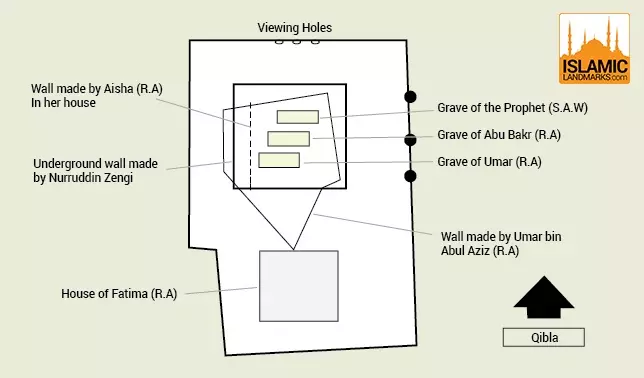
Send Salams to Abu Bakr al-Siddeeq (RA)
After visiting the grave of Prophet Muhammad (PBUH), one should step towards the right and say either one of the following Salam in front of Abu Bakr’s (RA) grave:
السَّلَامُ عَليْكَ يَا أَبَا بَكْرٍ
Translation: As-salāmu ‘alayka yā Abā Bakr.
Transliteration: Peace be upon you, O Abu Bakr.
اَلسَّلَامُ عَليْكَ يَا خَلِيْفَةَ الْمُسْلِمِيْنَ أَبَا بَكْرِ الصِّدِّيْقَ
Translation: Assalāmu ‘alayka yā khalīfata l-muslimīna Abā Bakri aṣ-Ṣiddīq.
Transliteration: Peace be upon you, O Caliph of the Muslims, Abu Bakr al-Siddiq.
السَّلَامُ عَليْكَ يَا خَلِيْفَةَ رَسُوْلِ اللهِ
اَلسَّلَامُ عَليْكَ يَا صَاحِبَ رَسُوْلِ اللهِ فِيْ الْغَارِ أَبَا بَكْرٍ الصِّدِّيْقَ وَرَحْمَةُ اللهِ وَبَرَكَاتُهُ
جَزَاكَ اللهُ عَنْ أُمَّةِ مُحَمَّدٍ خَيْرَاً
Transliteration: As-salāmu ‘alayka yā khalīfata rasūli llāh. As-salāmu ‘alayka yā ṣaḥiba rasūli llāhi fi l-ghāri Abā Bakrin aṣ-Ṣiddīq wa raḥmatu llāhi wa barakātuhu. Jazāka llāhu ‘an ummati Muḥammadin khayra.
Translation: Peace be upon you, O Caliph of Rasulullah. Peace be upon you, O companion of Rasulullah in the cave, Abu Bakr Siddiq. May Allah reward you well on behalf of the Ummah of Muhammad.
Send Salams Umar ibn al-Khattab (RA)
Once you have greeted Abu Bakr (RA) at the tomb, you can visit the other graves. Step towards the right again, and in front of you will be the grave of Umar ibn al-Khattab (RA). Use any one of the below-mentioned greetings to convey your salam to the second caliph of Islam:
السَّلَامُ عَليْكَ يَاعُمَرُ
Transliteration: As-salāmu ‘alayka yā ‘Umar.
Translation: Peace be upon you, O Umar.
السَّلَامُ عَليْكَ يَاعُمَرُ أَعَزَّ اللهُ بِكَ الإسْلَامَ جَزَاكَ اللهُ عَنْ أُمَّةِ مُحَمَّدٍ خَيْراً
Transliteration: As-salāmu ‘alyka yā ‘Umar. A’azza llāhu bika l-Islām. Jazāka llāhu ‘an ummati Muḥammadin khayra.
Translation: Peace be upon you, O Umar. Allah gave honour to Islam through you. May Allah reward you well on behalf of the Ummah of Muhammad.
السَّلَامُ عَليْكَ يَا أَمِيْرَ الْمُؤْمِنِيْنَ
السَّلَامُ عَليْكَ يَا عِزَّ الْإِسْلَامِ وَالْمُسْلِمِيْنَ
عُمَرَ بْنِ الخَطَّابِ الْفَارُوْقَ
وَرَحْمَةُ اللهِ وَبَرَكَاتُهُ
جَزَاكَ اللهُ عَنْ أُمَّةِ مُحَمَّدٍ خَيْراً
Transliteration: As-salāmu ‘alyka yā amīra l-mu’minīn. As-salāmu ‘alyka yā ‘izza l-Islāmi wa l-Muslimīn. ‘Umara bni l-Khaṭṭābi l-Farūq. Wa raḥmatu llāhi wa barakātuhu. Jazāka llāhu ‘an ummati Muḥammadin khayra.
Translation: Peace be upon you, O leader of the faithful. Peace be upon you, O pride of Islam and Muslims, Umar ibn al-Khattab al-Faruq. And the mercy of Allah and His blessings. May Allah reward you well on behalf of the Ummah of Muhammad.

Can You Visit Prophet Muhammad’s (PBUH) Grave?
Yes, you can visit the grave of Prophet Muhammad (PBUH). It is situated in Rawdah Mubarak inside Masjid Nabawi, and while you cannot stand at the site of the grave of Rasulullah PBUH, you can view the tomb from the window in the golden grill.
Reward for Praying in Rawdah Mubarak
The Messenger of Allah SWT said, “The area between my house and my pulpit is one of the gardens of Paradise.” (Bukhari)
According to Islamic scholars, the land on which Rawdah Mubarak is situated will be transferred to Jannah on the Day of Judgement. This means the reward for praying in Rawdah Mubarak ensures admittance to Paradise. Thus, one should make the most of this opportunity by asking Allah SWT for forgiveness, mercy, and blessings.
In fact, the Messenger (PBUH) of Allah SWT said, “Whoever performs his Hajj in Makkah, then comes to Madinah with the sole aim of visiting me in my Masjid, for him shall be written (the rewards of) two accepted Hajj.” (Daylami)
Prophet Muhammad (PBUH) said, “When a person stands at my grave reciting blessings on me, I hear it; and whoever calls for blessings on me in any other place, his every need in this world and the hereafter is fulfilled, and on the day of Qiyamah I shall be his witness and intercessor.” (Bayhaqi)
“The Rawdah is part of the Prophet’s (PBUH) mosque, and the prayer in it equals in reward of 1,000 prayers. However, there is no doubt that the Rawdah is of more excellence because the Prophet (PBUH) distinguished it and did not distinguish any other parts of the mosque for being a garden from the gardens of Paradise.” (Bukhari)
Duas to Read While in Masjid Nabawi
It’s a Sunnah to make the Niyyah (intention) of visiting the tomb or grave of Prophet Muhammad (PBUH) and praying in Masjid Nabawi. Upon arriving at the door of Masjid Nabawi, put your right foot forward and recite this dua:
.بِسْمِ اللهِ، اللَّهُمَّ صَلِّ عَلَى مُحَمَّدٍ. اللَّهُمَّ اغْفِرْ لِي وَافْتَحْ لِي أَبْوَابَ رَحْمَتِك
Transliteration: Bismi-llāh, Allāhumma ṣalli alā Muhammad. Allāhumma-ghfir lī wa-ftaḥ lī abwāba raḥmatik.
Translation: In the name of Allah, send blessings upon Muhammad (SAW). O Allah, open for me the doors of Your Bounty.
Visiting Madinah
You can visit the grave of Prophet Muhammad (PBUH) located in Masjid Nabawi in the heart of Madinah, Saudi Arabia. After migration from Makkah, Prophet Muhammad (PBUH) worked on constructing Masjid Nabawi and led several prayers for years. He had spent all his life in the sacred city and even passed away in Medinah.
If you plan to visit the city of Prophet Muhammad (PBUH), start by making an intention: “O Allah! I start my journey to the holy tomb of your beloved Prophet Muhammad (PBUH) with a pure heart and a sincere intention. Please accept it from me.”
Enter Masjid Nabawi putting your right foot first. Pray two Rakat in Riyad al-Jannah, offer your Salam to Prophet Muhammad (PBUH) and his companions, and fulfil the Sunnah of offering forty prayers.
While stating the reward of praying in Masjid Nabawi, Prophet Muhammad (PBUH) said, “The prayer in my Masjid (Masjid An-Nabawi) is better than one thousand (1000) prayers in any other masjid with the exception of Masjid Al-Haram, and a prayer in Masjid Al-Haram is better than one hundred thousand (100,000) prayers.”
Visiting Jannatul Baqi
You can also visit Jannatul Baqi, also called Baqi al-Gharqad. It is situated in the southeastern region of Masjid Nabawi. Jannatul Baqi houses graves of some of the family, friends, and some of the most beloved companions of Prophet Muhammad (PBUH), including his wives, daughters, martyrs of Harra, Imam Nafi, Imam Malik, Uthman ibn Affan, and Halima al-Sadiyya.
Aisha (RA) narrated, “The Prophet Muhammad (PBUH) used to leave his bed at night. I would follow him and see that he entered Baqi. He used to stay there for a while, raising his hands to the heavens whilst praying for the people of Baqi and seeking forgiveness for them. Upon his return, I asked him regarding this, to which he replied: ‘I have been commanded to pray for them.”
She later asked (the Prophet Muhammad (PBUH)): “How do I greet them (i.e., the people of Baqi’)? He replied, ‘Say: Peace be upon you, O Inhabitants of this land from the believers and Muslims. May Allah have mercy upon those who have left this world and those who will eventually leave. We will, God willing, join you.”
Therefore, when visiting Jannatul Baqi, one should raise their hands and pray for forgiveness for the Muslim Ummah and all inhabitants of the sacred cemetery. You can also recite the following dua:
السَّلَامُ عَلَيْكُمْ دَارَ قَومٍ مُؤْمِنِين، وَأَتَاكُم مَا تُوعَدُونَ، غَداً مُؤَجَّلُونَ، وَإِنَّا إِنْ شَاءَ اللهُ بِكُم لَاحِقُونَ، اَللَّهُمَّ اغْفِرْ لِأَهْلِ بَقِيعِ الْغَرْقَدِ
Transliteration: As-salamu ‘alaykum dar qawmin mu’minin, wa atakum ma tu’adun, ghadan mu’ajjalun, wa inna in sha’a-llahu bikum lahiqun. Allahumma-ghfir li-ahli Baqi’-l-Gharqad.
Translation: Peace be upon you, home of believing people. What you were promised and you deferred until tomorrow has come to you. We shall, if Allah wills, be joining you. O Allah, forgive the inhabitants of Baqi’ al-Gharqad
Other Important Landmarks
Every Masjid holds great significance in Islam. This section will discuss three of the most important Islamic landmarks that you can visit.
- Masjid Quba, Madina
Masjid Quba is one of the largest mosques in the world visited by thousands of Muslims every year. It was constructed as a landmark to highlight the point where Prophet Muhammad (SAW) and Abu Bakr (RA) stayed during Hijrah (Makkah to Madina).
Prophet Muhammad (SAW) said, “He who purifies himself at his home and comes to Masjid Quba and offers two Rakats therein will be rewarded the reward of an Umrah (lesser pilgrimage).” [Sunan ibn Majah]
- Masjid Al Qiblatayn
Masjid al Qiblatayn is the mosque in which Prophet Muhammad (SAW) received the revelation to change the Qiblah from Bait al-Maqdis to the Holy Kaaba.
It is one of the oldest mosques in Islamic history that you can visit. It is said to have two Qiblas.
- Masjid Al Haram
Masjid al-Haram, also known as the Grand Mosque, is the holiest and most sacred mosque in Islam. It is located in the city of Mecca in Saudi Arabia. The mosque surrounds the Holy Kaaba, which is the most sacred site in Islam and the focal point for Muslims around the world during their daily prayers.
Allah SWT in the Holy Quran says, “And from wheresoever, you start forth (for prayers), turn your face in the direction of Al-masjid-al-haram (at Makkah), and whosoever you are, turn your faces towards, it (when you pray) so that men may have no argument against you except those of them that are wrong-doers, so fear them not, but fear Me! – And so that I may complete My Blessings on you and that you may be guided.” [Holy Quran, 2:150]
Summary – What to Say When Visiting the Prophet’s (SAW) Grave
Now that you know what to say when visiting the Prophet’s (SAW) grave, make the most of this sacred opportunity by saying Salam to the last Messenger of Islam (SAW) and ask him to be a Wasilah for you in this world and the Hereafter.
Recite the following dua and supplicate in your native language, asking Prophet Muhammad (PBUH) to take you with him to Jannah on the Day of Judgement.
يَا رَسُوْلَ اللهِ، أَسْأَلُكَ الشَّفَاعَةَ وَأَتَوَسَّلُ بِكَ إِلَى اللهِ أَنْ أَمُوْتَ مُسْلِمَاً عَلَى مِلَّتِكَ وَسُنَّتِكَ
Transliteration: Yā rasūla llāh as’aluka ash-shafā’ata wa atawassalu bika ila llāhi ‘an ‘amūta Musliman ‘ala millatika wa sunnatik.
Translation: O Rasulullah! I request your intercession, and I ask Allah, through you, to enable me to die on your religion and your Sunnah.
May Allah SWT bless us all with a chance to visit the grave of Prophet Muhammad (PBUH) and pray Salah in Rawdah Mubarak, as well as visit the nearby graves.
Explore The New Pilgrim App
The Ultimate App
for Hajj and Umrah!




